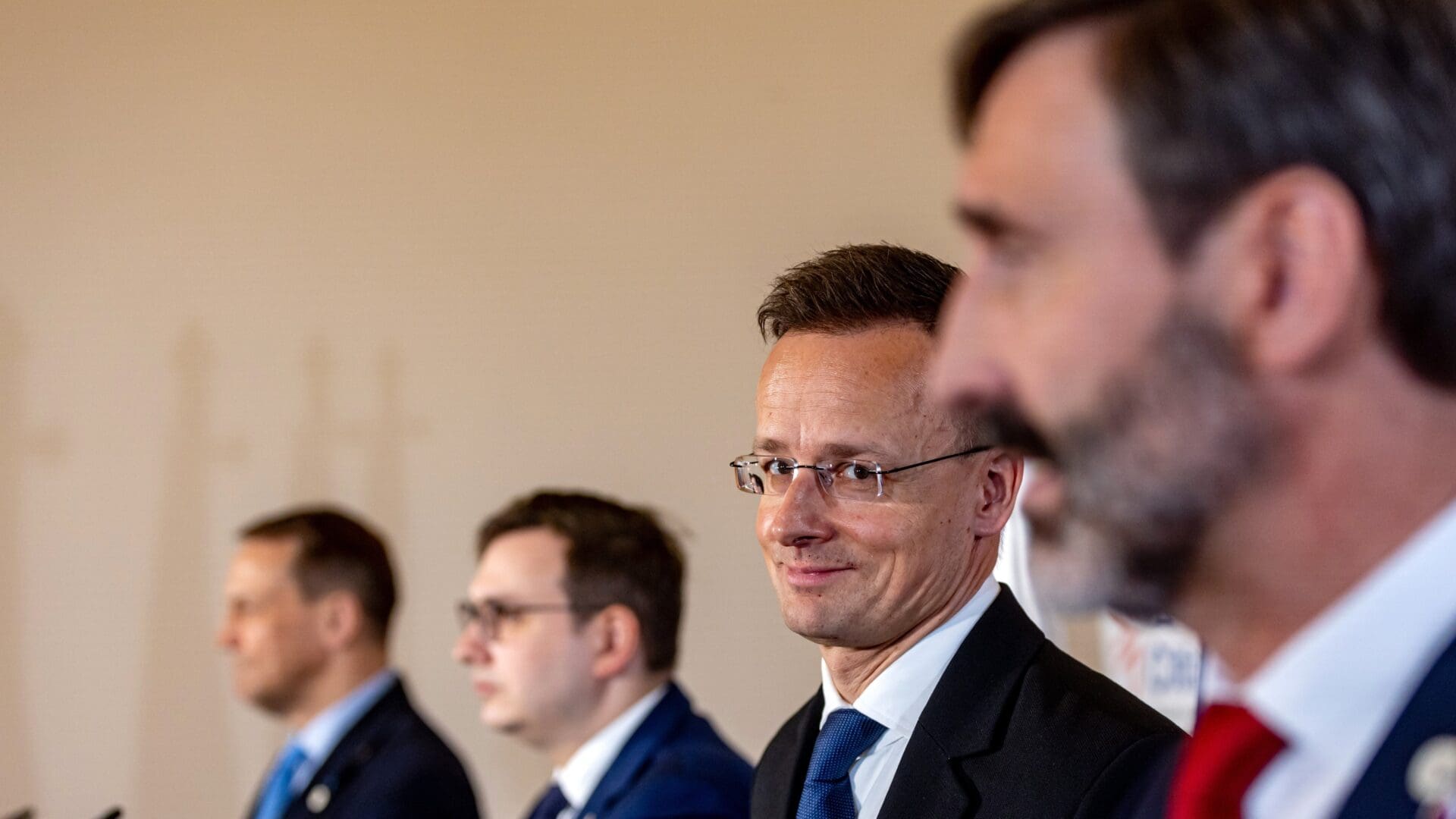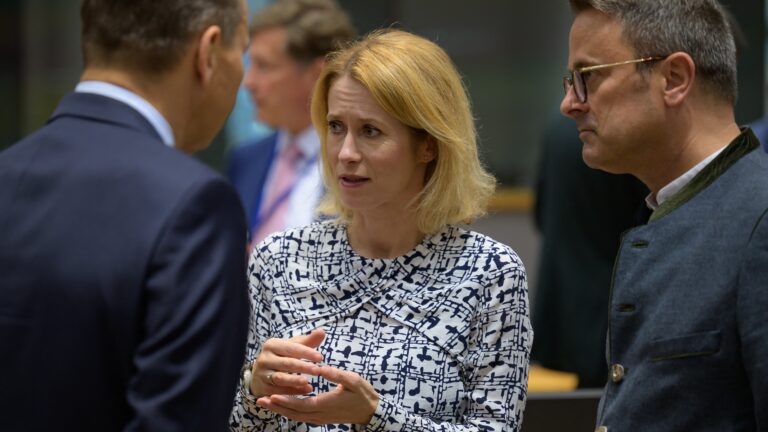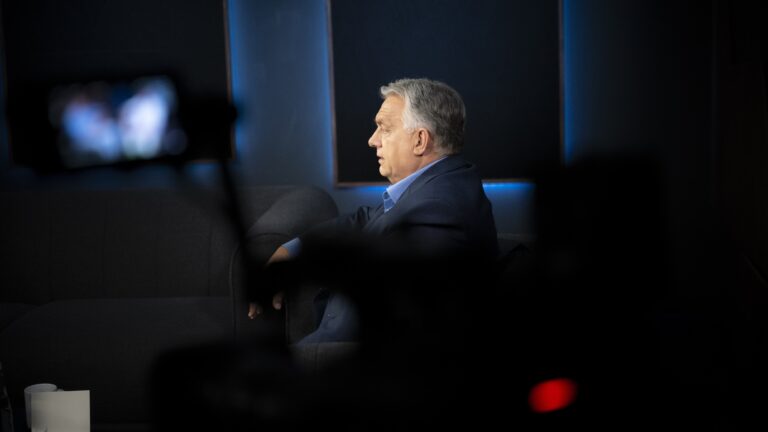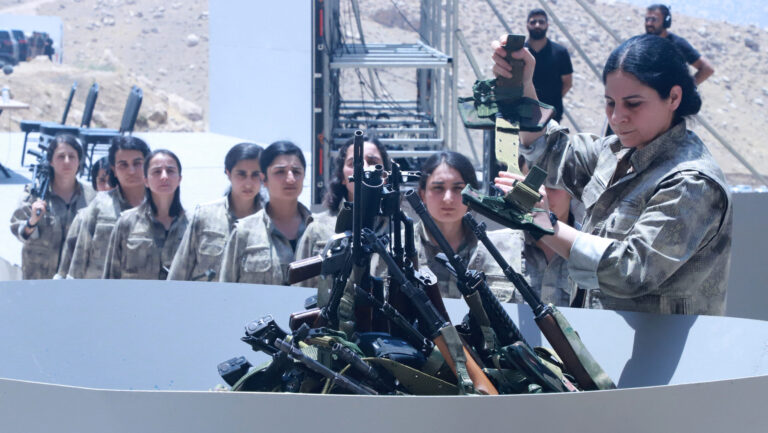This article was published in Vol. 4 No. 1 of our print edition.
The Visegrad Group is going through difficult times due to the growing geopolitical tensions and increasing pressure from Moscow, Brussels, and Washington. The regional alliance of the Czech Republic, Hungary, Poland, and Slovakia faces internal and external challenges. Until recently, the V4 was important to all of its members; however, finding the delicate balance between cooperation and confrontation is becoming increasingly difficult. The uneven outcome of recent elections in Poland and Slovakia will presumably heighten tensions. While the new government in Bratislava will aim to intensify collaboration, the Tusk government in Warsaw will probably stymie it. The Russia–Ukraine War has fundamentally changed the perception of cooperation in the region. Will divergent positions on the conflict undermine the V4? How does the political ideology of each country’s government affect the formation of a shared consensus? These issues are becoming increasingly complex. At the same time, to maintain its regional position, it is crucial for the alliance to find common ground.
On 24 February 2022, the Russian Federation launched a special military operation in Ukraine, which rapidly escalated into the most extensive military conflict in Europe since the Second World War. Although tensions had been in the air since the annexation of Crimea in 2014, few expected the outbreak of a war on such a scale. Although on paper the struggle is between two warring sides, in reality—directly or indirectly—many nations are involved. Because of their close physical proximity, the war has significantly affected the politics of the Central European region, shaken V4 cooperation, and will contribute to its change. Even though the Czech Republic, Hungary, Poland, and Slovakia are bound together not only by political, economic, and regional interests but also by a shared past, culture, religion, and regional identity, the escalation of the war has triggered significant divisions among them.1
Practical cooperation has recently become increasingly complicated as their internal unity has faltered. Due to their pro-Ukraine policy, the Czech Republic, Poland, and Slovakia have taken a strong stance against the Russian Federation in their foreign policy rhetoric––similar to that of the EU and the US.2 Hungary, on the other hand, has not been so critical. Unlike the other Visegrad countries, Budapest provides mostly humanitarian aid to Kyiv, and is the only EU member state to maintain good working relations with Moscow. These differences created difficulties between Budapest and its allies. In addition, the prime minister of Hungary vetoed support for Ukraine from EU funds in December 2023, which provoked the disapproval of many states, including Poland.3 The package has since been given the green light in Brussels, but relations remain frozen. The current disagreements within the V4 have been further exacerbated by the anti-Russian sanctions imposed by the EU, especially the oil and natural gas embargo.4 In addition, there has been a political change in Poland, as a result of which Donald Tusk, one of the biggest opponents and critics of Hungarian Prime Minister Viktor Orbán, has become the leader of the country. In light of these circumstances, the V4 faces the biggest challenge in its history. What are the factors that may accelerate this process of splintering, or perhaps reverse it?
‘Orbán has argued from the start of the conflict that European sanctions would be ineffective and counter-productive and would punish the EU more than the Russian Federation’
The escalation of the Russia–Ukraine War has directly impacted the Central European region and the V4. Hungary, Poland, and Slovakia are situated on its border, thus constituting a potential theatre in the event of further escalation. Given this, the war has not only led to a flood of refugees, but also a widespread fear of potentially getting drawn into the conflict. At the same time, the V4 is not united politically. While all members of the alliance have condemned the Russian aggression, it has become clear that there is no agreement on such critical issues as the role and goals of the V4 with regard to the conflict. Palpable differences of opinion are to be observed. It is also important not to forget that this is not the first time the relationship among the V4 members has been troubled. From the beginning, there have been contradictions and disagreements. Looked at from a longer-term perspective, it can be said that it is a fundamental problem that the V4 has not built an organizational structure or institutional system. The only multilateral body is the Bratislava-based International Visegrad Fund (IVF). Additionally, effective cooperation is often determined by the shared values and relations between politicians, whether they are part of the same European party or not.5
While the Czech Republic, Poland, and Slovakia were on the side of Ukraine in every aspect, offering unequivocal support, including military assistance, to Kyiv, and strongly condemning Russian aggression in every possible forum, Hungary took a more restrained position. Not long before the beginning of the military operation, Orbán had travelled to Moscow and called for a peaceful, negotiated settlement of the issue. He even referred to his trip as a ‘peace mission’.6 It was for precisely this reason that the outbreak of the war affected him so severely, especially as he was at the time preparing for upcoming elections. Hungary, just like its partners, condemned Russian aggression and expressed support for Ukraine’s territorial integrity and sovereignty, but also continued to advocate for a diplomatic solution.7 Budapest also accepted the EU and NATO statements condemning the events and assured the president of the European Council that Hungary would be part of the joint EU action and support sanctions against the Russian Federation.8 Unlike its partners, Budapest has not wished to help Kyiv with arms and has refused to allow the EU to supply arms through its territory.9 At the same time, Hungary did not turn its back on its neighbour, as it executed the most significant humanitarian rescue operation of its history.10
In order to understand Budapest’s pro-peace stance, it should not be forgotten that Hungary has faced armed conflict with Russia numerous times in the past two centuries and lost in every single case. All these clashes had severe and long-term negative consequences on every level. Presumably, Orbán learned the historical lesson and did not want to open a front in a war that was not his nation’s. Nor can Hungary be expected to take an armed stand on the side of Kyiv, where ethnic minorities––including Hungarians––suffered more legal disadvantages in the last decade than in Soviet times. Hungary has wanted to stay out of this conflict, but the world has not allowed it to do so without being stigmatized.
Because of its particular experience of Russia, Poland has taken the most radical anti-Russian stance not just in the V4 but even in the EU as a whole. Russia’s unlawful invasion has divided Warsaw’s and Budapest’s policy responses, and the resulting disagreement has significantly impacted their future political cooperation.11 At the outbreak of the war, Poland described Hungary’s policy as a tactical alliance with a view to the parliamentary elections, which were only a few weeks away. Despite Hungary’s condemnation of Russian aggression and its humanitarian support for Ukraine, its portrayal of itself as a neutral third-party actor and its focus on the need for ‘restoring peace’ through negotiations alienated Warsaw. In the eyes of many Poles, Budapest’s position is contrary to the interests of Poland, the V4, NATO, and the EU.12 The extent to which Polish–Hungarian friendship could be maintained in the face of such an opposed strategy had raised essential questions even before the Polish elections of 15 October 2023. The election result strained both the V4 partnership and Hungarian–Polish relations even further. Donald Tusk is considered one of Orbán’s most prominent opponents in the Visegrad Group, and among European leaders. If Warsaw turns against Budapest, it could further erode Hungary’s authority in international relations and pave the way for the withdrawal of its voting rights within the European Council.13
The Czech leadership has also taken a hostile position towards the Russian Federation. Firstly, Prague strongly condemned Moscow’s clear violation of international law, and in addition, after it became certain in April 2021 that the Russians had been involved in the explosion of the Vrbetice ammunition depot in 2014, severe anti-Russian measures were taken. The deputy chairman of the Russian Upper House of Parliament’s Foreign Affairs Committee called for proportionate countermeasures. At the same time, the United States expressed its support and appreciation for the actions of its ally.14 The Czech Republic’s active engagement with Ukraine at the outbreak of the war was partly due to the proximity of the Czech presidency to the European Union (second half of 2022), which, even without the war, had been expected to increase the country’s focus on deepening relations with Western Europe and moving closer to the European political mainstream.15 However, it is now certain that they will not support any V4 shift away from the EU mainstream, nor Hungary’s policy of continued ties with Russia.
Until the Slovak parliamentary elections in September 2023, a strong parallel could have been drawn between the positions of the Czech Republic and Slovakia on the conflict. Given the solid Western orientation of the former Slovak government, there was no question which side it would take. However, the extent of Slovak involvement is surprising. Despite the relative weakness of its armed forces, Slovakia donated a significant part of its military equipment, including its entire MiG-29 fleet, an S-300 air defence battery, and part of the KUB missile system to Ukraine. The tone of the Slovak government’s diplomacy towards the Russian Federation also hardened significantly. At the same time, it is also important to note that most of the Slovak population did not stand behind its government’s total support for Ukraine. A significant number of citizens blamed NATO for the escalation of the conflict and considered the sanctions imposed on Russia excessive or counter-productive.16 Furthermore, the increasingly unpopular government faced the challenge of an economic downturn, highly polarized domestic public opinion, and serious difficulties in becoming independent from Russian raw material supplies. If Bratislava’s stance towards Kyiv and Moscow had been maintained, Slovakia’s political position would probably have been strengthened in Brussels.17 However, the pro-Ukrainian government lost elections in September 2023. A national reversal occurred, and a new Slovak government was formed, which, like Hungary, urged the end of the conflict through cease-fire and negotiations. Prime Minister Robert Fico, elected for a fourth time, called for peace in Brussels one day after his inauguration, and announced that no further Slovak armament shipments would be sent to Ukraine.

The war in Ukraine has fundamentally reshaped the international arena. Moscow’s actions seriously violate the basic principles of international law, which require Russia to settle its dispute with Ukraine peacefully, to respect its territorial integrity and sovereignty, and to prohibit genocide.18 Their actions are all the more shocking given that the Russian Federation is a permanent member of the United Nations Security Council. Whatever Moscow’s original plan was, that plan had to be modified. To the surprise of many, the Western community reacted decisively and stood by Kyiv not only in words but also in deeds. EU member states immediately began cooperating to aid Kyiv. Although they eventually unanimously condemned the Russian aggression and voted in favour of the EU sanctions package, in the beginning, they were divided over the military and humanitarian assistance to be provided, which created new tensions not only in Brussels, but also in the countries bordering the conflict zone. Russia, however, underestimated the West and made another mistake in its calculations. Along with most of the international community, they felt certain that even if Kyiv tried to resist and fight back, it would only be capable of doing so for a few days. But that is not what happened. Ukraine has stood up and continues to fight, primarily using military equipment that Western countries have donated. The effectiveness of these measures varies, but their sacrifice is heroic. At the same time, resistance has entailed vast numbers of casualties and material destruction, the consequences of which are drastic for the sustainability of the Ukrainian nation and statehood.
In practical terms, as soon as the invasion began, the V4 nations were suddenly inundated by a flood of refugees.19 Although they did not have the logistics and infrastructure to cope with such a large human influx, they mobilized resources and provided assistance quickly. Their rapid response was of enormous importance, as Europe had previously perceived the V4 as countries pursuing a robust anti-migrant policy. During the migration crisis of 2015–2016, all V4 countries had challenged the introduction of refugee quotas by the European institutions. Hungary, to protect its territory, even built a physical fence along the border.20 The positive attitude of the V4 countries towards the Ukrainian refugees reflected what the V4 countries had declared countless times before, that there is an evident difference between refugees and migrants, and not supporting migration does not mean refusing help to those in trouble.
With the commencement of Russian aggression in Ukraine, opposition to Russia and sympathy for the refugees became more evident within the V4 nations. There are two main reasons for this. On the one hand, Russia’s actions in Ukraine provoked almost universal sympathy towards the Ukrainian people. On the other hand, the fact that there had already been a Ukrainian diaspora in the V4 countries before the invasion helped, because the locals already had experience of them, so they were more readily accepted. In this way, the V4 were united not only at the governmental but also at the social level.21 However, this solidarity seems to have decreased in recent months, primarily due to the competitive advantages the EU has provided to Ukrainians over the domestic population.
‘Hungary has wanted to stay out of this conflict, but the world has not allowed it to do so without being stigmatized’
The most significant criticism towards Hungary from other V4 Countries has concerned its posture towards the Russian Federation. While Bratislava, Prague, and Warsaw have assisted Kyiv with substantial military equipment such as light weapons and ammunition, tanks, artillery, anti-aircraft guns, and even aircraft, as well as Soviet-made helicopters still in active service in some V4 armies, Budapest’s contribution was primarily limited to humanitarian aid and diesel fuel.22 From the beginning of the invasion, Orbán has been reluctant to support Ukraine militarily,23 nor did he allow its allies to transfer weapons to Ukraine across Hungarian territory. Despite his support for EU sanctions, the prime minister and members of his government have regularly criticized these measures aimed at punishing Russia.24 On the one hand, Orbán obviously does not want to confront a country with which he has close economic ties. On the other hand, this attitude has been the most effective way to provide protection to the one hundred thousand ethnic Hungarian community living in Western Ukraine. Orbán has argued from the start of the conflict that European sanctions would be ineffective and counter-productive and would punish the EU more than the Russian Federation.
In some forums, Poland, Slovakia, and the Czech Republic have also joined the mainstream opinion on Hungary, condemning Orbán as ‘Putin’s henchman’ for not helping the Ukrainians militarily. None of them believed that Hungary––as a peace-loving NATO member state––did not want to get involved in conflicts with third countries such as Russia or Ukraine.25 The latter sentiment was, moreover, reinforced by the fact that invoking the collective security mechanism in NATO would threaten a global war if a member state were to engage in hostilities with a third-party actor. Orbán’s government has not been willing to risk that outcome.
As months have passed, it has become increasingly clear that the war in Ukraine is reshaping the political dynamics of Central and Eastern Europe. Months after the Russian offensive, little has changed. Budapest’s close ties with Moscow were already a thorn in the side of its NATO allies long before the invasion. They knew that Moscow had been giving natural gas to Hungary at a discount price, and they also learned about the loans the Russians provided to finance the expansion of the Paks nuclear power plant. There have been critical voices about the operation of the Russian International Investment Bank in Budapest, which left Hungary shortly after the outbreak of the war. They argued that such favours are not given for free.26 At the same time, the Hungarian government operates with unprecedented electoral authority, and its decisions are accountable to the Hungarian citizens.
Hungary’s closest ally, Poland, has been sharply critical of Orbán and his government. Jarosław Kaczyński, Poland’s former deputy prime minister, scolded Prime Minister Orbán for his refusal to condemn Russia for the mass killing of civilians in Bucha, Ukraine.27 Polish President Andrzej Duda has also publicly criticized the Hungarian prime minister.28 This month Poland’s Prime Minister Donald Tusk declared that in Europe there is no Ukraine fatigue but there is Orbán fatigue.29 Of the V4, it is not only the Poles who consider Orbán’s attitude to the war in Ukraine to be seriously flawed. Influential politicians from both Slovakia and the Czech Republic have repeatedly blamed the Orbán government, with the result that at the end of March 2022, the defence ministers of the Czech Republic and Poland refused to attend a V4 meeting in Hungary.30 Cooperation then shifted to an even slower track. After the Wagner mercenary rebellion in the summer of 2023, many believed Hungary’s position might be reversed. However, at the V4 summit in Bratislava following the attack, Orbán said there was no reason for his country to change its foreign policy or approach to the Russia–Ukraine War. One positive of the meeting was that the V4 countries continued to agree on refugee policy.31
Whatever the tensions, there are still plenty of reasons for the V4 to cooperate. In Czech political discourse, both Hungarian and pro-Russian narratives are regularly reflected. For example, some pro-Russian politicians in the Czech Republic (such as Tomio Okamura, leader of the far-right opposition SPD) try to convince the Czechs that the country should follow Hungary’s example and negotiate with the Kremlin on natural gas supplies as the loss of Russian sources raises significant energy security issues.32
Although Jarosław Kaczyński, former president of the Council of Ministers of the Republic of Poland, criticized Hungary’s position on the war, he later said in an interview that Orbán had never let down his Polish partners at the EU level, so Poland would not break off relations with Hungary and intended to continue cooperation.33 Former Polish PM Mateusz Morawiecki also tried to find common ground with Hungary.34 The European Commission’s crackdown on Poland’s alleged disregard for the rule of law and its infringement proceedings against the country, just as it did against Hungary, could play a significant role here. At the same time, it is also important to note that Donald Tusk can expect an utterly different reception in Brussels than Morawiecki. As a former president of the European Council, he is expected to pursue a policy that is thoroughly acceptable to European progressives and will distance Warsaw from Bratislava and Budapest. At the same time, the rule of law does not seem any more solid in today’s Poland than it was before.
Until now, neither the Czech Republic nor Slovakia have had any significant problems with the European Commission, so there is no urgent need for them to restart V4 cooperation.35 In Slovakia, however, a national turn occurred in the September 2023 elections, which is frowned upon in Brussels. It is, therefore, possible that the Budapest–Warsaw connection will shortly be restructured as a Budapest–Bratislava one. The V4, currently in hibernation, will be hard to renew until the issues raised by the war in Ukraine are resolved. Petr Pavel, the new Czech president who took office in 2023, added that there is no point in reorganizing the V4 from the ground up. It would be much easier to wait for a change of government in Hungary.36 Looking at the state of the Hungarian opposition, there is almost no chance of that in the short term. Orbán’s victory in the 2022 elections was the biggest Hungary has seen since the fall of the Iron Curtain. At the same time, on the V4 level, action is still possible when there is a shared consensus. A good example is the recent joint step against the unlimited import of Ukrainian agricultural products. Unrestricted dumping of goods seriously harms all four countries, so a common position was born and articulated.37
The Visegrad Group has reached a tipping point in the face of growing geopolitical and security challenges. The external and internal dynamics of the regional alliance of the Czech Republic, Hungary, Poland, and Slovakia have encountered obstacles where the need for unity clashes with competing views, aims, and pressures. The Russian–Ukrainian conflict has significantly changed the course of cooperation. The ideological convictions of new and old governments in the member states make it even more difficult to find common ground and increasingly challenging to find the way back to practical cooperation. In the face of this growing complexity, the V4 faces a challenging task: to reconcile differences and present a united front. In other words, to find the least some common denominator, and use it as a basis for negotiation. The survival of the Visegrad Group depends on putting the collective good above individual interests. Only by finding common ground and strengthening the mutual goals that bind nations together can the V4 navigate the complexities ahead and enhance its regional relevance. However, this requires recognizing that the members have many more common interests than points of disagreement. They should not focus on the issues dividing them but on the issues uniting them. As long as there is a willingness amongst the leaders of the four countries, the Visegrad Group will have every chance to continue collaboration and represent the will of the whole Central European Region.
NOTES
1 Oliver39, ‘A Visegrádi Együttműködés jelenlegi kilátásai’ (Perspectives of the Visegrad Group), Reaktor (7 August 2022), https://reaktor.hu/2022/08/07/a_visegradi_egyuttmukodes_jelenlegi_kilatasai, accessed 29 October 2023.
2 Balázs Tárnok, ‘Az orosz–ukrán konfliktus hatása a visegrádi együttműködésre’ (The Impact of the Russia–Ukraine Conflict on the Visegrad Group), Szakpolitikai Elemzések 2022, I. (Ludovika Egyetemi Kiadó, 2022), 143–150.
3 ‘EU Summit: Hungary Blocks €50 Billion Ukraine Aid Deal’, DW (15 December 2023), www.dw.com/en/eu-summit-hungary-blocks-50-billion-ukraine-aid-deal/live-67727457, accessed 12 January 2024.
4 Oliver39, ‘A Visegrádi Együttműködés jelenlegi kilátásai’.
5 Oliver39, ‘A Visegrádi Együttműködés jelenlegi kilátásai’.
6 Magyarország Kormánya, ‘Békemisszió is a moszkvai látogatás’ (The Visit to Moscow Is Also a Piece Mission), Kormany.hu (1 February 2022), https://kormany.hu/hirek/bekemisszio-is-a-moszkvai- latogatas, accessed 12 January 2023.
7 Veronika Jóźwiak, ‘Hungary’s Reaction to the War in Ukraine’, The Polish Institute of International Affairs (2 March 2022), www.pism.pl/publications/hungarys-reaction-to-the-war-in-ukraine, accessed 28 October 2023.
8 Balázs Karóczkai, ‘Orbán Viktor is elítélte az orosz támadást’ (Viktor Orbán Condemned the Russian Attack), azonnali.hu (24 February 2022), https://azonnali.hu/cikk/20220224_orban-viktor-is-elitelte-az-orosz-agressziot, accessed 4 November 2023.
9 Jóźwiak, ‘Hungary’s Reaction to the War in Ukraine’.
10 ‘Hungary Extends Humanitarian Aid for Ukraine to Education’, Hungary Today (11 November 2022), https://hungarytoday.hu/hungary-extends-humanitarian-aid-for-ukraine-to-education/, accessed 5 December 2023.
11 Tárnok, ‘Az orosz–ukrán konfliktus hatása a visegrádi együttműködésre’, 143–150.
12 Jóźwiak, ‘Hungary’s Reaction to the War in Ukraine’.
13 Krisztina Koenen, ‘Hungary and the EU: A Deepening Divide’, GIS (17 May 2023), www.gisreportsonline.com/r/hungary-eu-divide/, accessed 7 December 2023.
14 ‘Kémbotrány Csehországban: a 29155-ös egység’ (Spy Scandal in Poland: Unit No. 29155), Szabad Európa (18 April 2021), www.szabadeuropa. hu/a/csehorszag-kembotrany-szkripal-vrbetice- oroszorszag-titkosszolgalat/31209796.html, accessed 29 October 2023.
15 Tárnok, ‘Az orosz-ukrán konfliktus hatása a visegrádi együttműködésre’, 143–150.
16 Michal Hudec, ‘Most Slovaks hold NATO Responsible for Tension in Ukraine’, Euractive (31 January 2022), www.euractiv.com/section/politics/short_news/most-slovaks-hold-nato-responsible-for-tension-in-ukraine/, accessed 29 October 2023.
17 Krzysztof Dębiec, ‘Slovakia: Strategic Dilemmas after the Russian Invasion of Ukraine’, Centre for Eastern Studies (10 May 2022), www.osw.waw.pl/en/publikacje/osw-commentary/2022-05-10/slovakia-strategic-dilemmas-after-russian-invasion-ukraine, accessed 29 October 2023.
18 Andrej Poleščuk, ‘Visegrad at Crossroads’, VSQUARE (22 September 2022), https://vsquare.org/visegrad-at-the-crossroads/, accessed 28 October 2023.
19 ‘Hadiállapot: sokan menekülnek Kárpátaljáról Magyarországra’ (State of War: Many Flee to Hungary from Transcarpathia), Euronews (24 February 2022), https://hu.euronews.com/2022/02/24/hadiallapot-sokan-menekulnek-karpatalosol-magyarorszagra, accessed 29 October 2023.
20 Éva Eszter Szabó, ‘Fence Walls: From the Iron Curtain to the US and Hungarian Border Barriers and the Emergence of Global Walls’, in: Walls, Material and Rhetorical. Past, Present, and Future. Guest-edited by Virginia R. Dominguez, Review of International American Studies, 11/1 (Spring–Summer 2018), 84–85, 95–98, www.journals.us.edu.pl/index.php/RIAS/article/view/6385/5347.
21 Poleščuk, ‘Visegrad at Crossroads’.
22 Bálint Szalai, ‘Rengeteg dízelt adhat a Mol az ukrán hadseregnek’ (Huge Amount of Diesel May Be Given by MOL to the Ukrainian Army), Szabad Európa (24 December 2022), www.szabadeuropa.hu/a/ukrajna-dizel-import/32186019.html/, accessed 6 December 2023.
23 ‘The Position of the V4 towards War in Ukraine’, Visegrad Insight (28 February 2022), https://visegradinsight.eu/the-position-of-the-v4-towards-war-in-ukraine/, accessed 28 October 2023.
24 Poleščuk, ‘Visegrad at Crossroads’.
25 Oliver39, ‘A Visegrádi Együttműködés jelenlegi kilátásai’.
26 Wojciech Przybylski, ‘The End of the Budapest– Warsaw Axis’, Politico (2 April 2022), www.politico.eu/article/hungary-poland-axis-diplomacy-ukraine-russia-war-vikto0r-orban-fidesz-pis-visegrad-group/, accessed 3 November 2023.
27 Viktor Jack, ‘Poland’s Kaczynski Slams Orbán for Refusing to Condemn Bucha Killings’, Politico (8 April 2022), www.politico.eu/article/poland-kaczynski-slams-hungary-orban-for-refusing-to-condemn-bucha-killings/, accessed 29 October 2023.
28 Przybylski, ‘The End of the Budapest–Warsaw Axis’.
29 EU Debates, ‘Polish Leader Donald Tusk Criticizes Hungary’s ‘Egoistic Game’, YouTube (1 February 2024), www.youtube.com/watch?v=iC78dkODhAY, accessed 6 February 2024.
30 Orsolya Kuli, ‘Cseh védelmi miniszter: Sajnálom, hogy fontosabb az olcsó olaj, mint az ukránok vére’ (Czech Defense Mnister: I Am Sorry that Cheap Oil Is More Important than Ukrainians’ Blood), Index (25 March 2022), https://index.hu/kulfold/2022/03/25/haboru-orosz-ukran-konfliktus-oroszorszag-ukrajna-csehorszag-v4-jaroslaw-kacyznski-volodimir-zelenszkij-orban-viktor/, accessed 29 October 2023.
31 Benedek Balizs, ‘Orbán Viktor a V4-csúcson: “Nincs okunk változtatni azon az irányon, amit eddig követtünk”’ (Viktor Orbán at the V4 Summit: There Is No Reason for Us to Change the Direction We Have Taken), Index (26 June 2023), https://index.hu/kulfold/2023/06/26/v4-magyarorszag-orban-viktor-petr-fiala-odor-lajos-mateusz-morawiecki/, accessed 29 October 2023.
32 Poleščuk, ‘Visegrad at Crossroads’.
33 Levente Balázsi, ‘Jarosław Kaczyński: Orbán Viktor soha nem hagyta cserben partnereit’ (Jarosław Kaczyński: Viktor Orbán Has Never Let down His Partners), Index (2 April 2022), https://index.hu/kulfold/2022/04/02/lengyelorszag-visegradi-negyek-jarowslaw-kaczynski-orban-viktor/, accessed 2 November 2023.
34 Aleksandra Krzysztoszek, ‘Morawiecki: Poland to Revive Relations with Hungary’, Euractiv (5 September 2022), www.euractiv.com/section/politics/short_news/morawiecki-poland-to-revive-relations-with-hungary/, accessed 3 November 2023.
35 Poleščuk, ‘Visegrad at Crossroads’.
36 Júlia Kozics, ‘A cseh államfő a magyar kormányváltást várja’ (The Czech Head of State Is Waiting for the Change of Government in Hungary), Index (7 March 2023), https://index.hu/kulfold/2023/03/07/petr-pavel-csehorszag-orban-viktor-magyar-kormany-oroszorszag-beketargyalas-v4/, accessed 4 November 2023.
37 ‘A V4-ek kaució bevezetését kezdeményezik az ukrán gabonával kapcsolatban’ (V4 Take the Initiative to Introduce a Deposit on Ukrainian Grain), Magyar Hírlap (27 September 2023), www.magyarhirlap.hu/kulfold/20230926-a-v4-orszagai-kaucio-bevezeteset-kezdemenyezik-az-ukran-gabonaval-kapcsolatban, accessed 2 December 2023.
Read more on the V4 Group:








